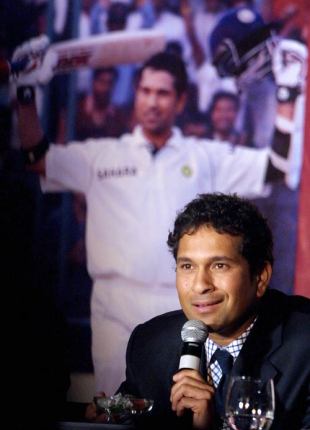Giving India a boost since 1989
Richard Gillis

|
|||
|
Related Links
Players/Officials:
Sachin Tendulkar
Teams:
India
|
|||
The story of Sachin Tendulkar is usually told in one currency - runs, and more runs. But there is another: in June 2013, Forbes listed his annual earnings at $US22m. The precise value doesn't really matter: above all, Brand Sachin has been India's confidence index throughout a period of rapid economic liberalisation. As an essentially socialist nation, crippled by the "Hindu rate of growth", gave way to a buoyant capitalism, so Tendulkar's runs enhanced its self-esteem. He was a one-man Sensex - Mumbai's stock exchange - seemingly reflecting the mood of the nation.
Like the IPL, Brand Sachin has been used to project the country as an economic powerhouse; unlike the IPL, its integrity has rarely been questioned. As with the value of traded commodities, the direction of travel is the most important thing. And since 1989, when Tendulkar made his Test debut and endorsed his first brand - Boost, a nutritional drink - his stock price has been going up and up. In all, he is believed to have lent his name to over 50 brands, earning an estimated $80m in endorsements alone.
That wealth is based in particular on his popularity as an endorser of corporate brands, including Coca-Cola, Adidas, Toshiba and BP Castrol oil (alcohol and tobacco are off limits). Tendulkar is often seen as India's answer to David Beckham, or - pre-scandal - Tiger Woods. But there are stronger parallels with the packaging and selling of Arnold Palmer in 1960s USA. Palmer's America prefigured Tendulkar's India, full of economic and social optimism, with sport at its heart.
With the help of his agent Mark McCormack, Palmer defined the role of the brand ambassador, creating the blueprint used by Indian businessman Mark Mascarenhas to build Tendulkar's profile. In 1996, Mascarenhas's WorldTel agency guaranteed his new client $7.5m a year; in 2001, that rose to $18m. Tendulkar introduced commerce to Indian sport. He changed the game. Palmer's value outlasted his career - 50 years after he last won a major, he remains in the top ten of the world's highest-earning golfers - and Tendulkar's sponsors were keen to plan ahead. "Whether he plays cricket, it will not affect our relationship," said Adidas India brand director Tushar Goculdas. Coca-Cola's Indian representative reckoned Tendulkar was "an icon of happiness, much like Coca-Cola". Property developers Amit Enterprises were planning "Sachin-branded residences"; their managing director described Tendulkar as "an evergreen brand".
His initial post-retirement activity balanced commerce with a strong social agenda: Tendulkar, whose wife Anjali is a paediatrician, became the first UNICEF ambassador for South Asia, with a focus on children's health. Recently, Aviva Life Insurance depicted him as an emblem of reliability with an advert in which the adult Tendulkar offers advice to his 16-year-old self before his maiden Test innings.
So where next? Harish Krishnamachar, senior vice-president of the Indian branch of World Sport Group, the company that manages Tendulkar's endorsement, says: "Brand Sachin has come to represent respect, consistency, humility and excellence - its stature has grown with Sachin getting the Bharat Ratna and becoming a Rajya Sabha MP. Through the brands he represents, he will be looking to share what it took to become a world-class sportsman, and how he managed to stay there for so long."
India, though, is an increasingly young nation. With half the population aged 30 or under, Tendulkar's legacy may not last for ever. Bollywood star Amitabh Bachchan is one of the most featured faces in Indian advertising, and reinvention has been the hallmark of his 45-year career. But Krishnamachar does not foresee a problem: "Sachin has built up such a stature and reputation over the years that there is no reason why the second phase of his life will not be as successful as the first."

